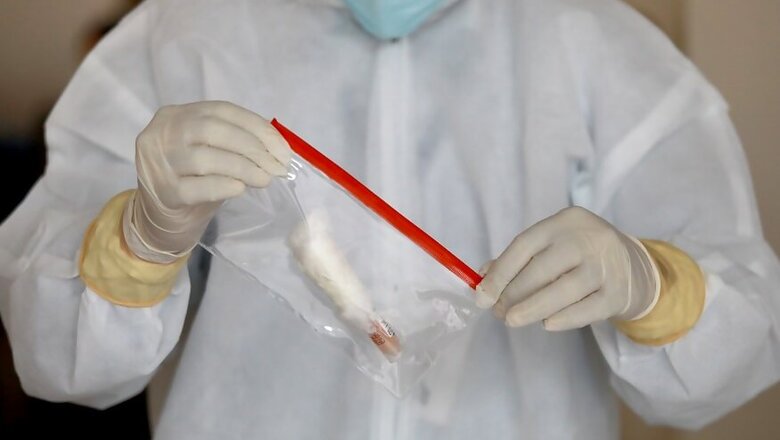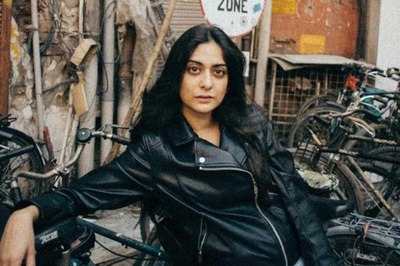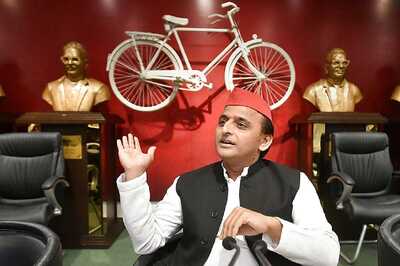
views
India celebrates National Doctor’s Day on July 1 every year to mark the birth and death anniversary of eminent physician, Dr Bidhan Chandra Roy. The year 2020 is marked by the COVID-19 pandemic, and it’s through the undaunting service of doctors and healthcare professionals that the world has been able to tackle the effects of this viral infection.
And while celebrating the contributions of our doctors is important, you should take this day to also think about the humanity and kindness with which they serve you. We talked to Dr Jasmine Kaur, a Junior Resident posted to the COVID-19 ward at a hospital in Delhi, and she walked us through her experiences over the last few months.When doctors turn into protectors
“Currently, we’re working alternating 12-hours shifts: 12 hours’ day duties one day, 12 hours’ night duties on the next. We have to work 14 days, then we get a 14-day quarantine break. Seven of those quarantine days are spent in a hotel room provided to us, and the remaining seven at home,” Dr Jasmine explains while adding that she doesn’t actually go home during the remaining seven days.
“I am scared that if I go back home without testing negative, I will infect my parents. Both my parents are old. My father has diabetes and my mother recently had a fracture. So, I just can't risk being there with them,” she remarks. She has rented a room where she stays alone during the quarantine week, because she believes doctors have a responsibility to treat patients while also protecting the remaining citizens from infections.
“We have to maintain distance when we are out so that if we have an infection, we don’t give it to anybody else. So, I usually don’t go near anyone when I am outside the hospital or room. I usually completely avoid going outside, until and unless it is absolutely necessary for me,” she explains. Yes, that can be as lonely as you can imagine, but for doctors like her, service comes first, even when you have to wear protective gear for six hours continuously.About PPEs and suffocation
“It is very tiring both mentally as well as physically. Before the pandemic, all the work in the hospital would be done without any hurdles,” Dr Jasmine says. “But now, the patient load, necessity for precautions, the mental engagement, the paperwork and physical work have increased. And after donning the PPE, the physical strength needed to do all this work doubles.”
If you find wearing a mask for an hour or two to be a task, just listen to what Dr Jasmine has to say about wearing a complete PPE kit for six hours while serving patients: “It’s very nauseating, you can’t feel anything, your hands will be numb in the gloves, you will be sweating profusely and you will be feeling tachycardic (i.e. your heart rate will be increased). The temperature of your body shoots up and you start feeling dizzy. The longer you spend wearing the kit, the longer all these reactions will last. But, you have to do it for the patients.”Being human on the COVID ward
And stay she does. “Patients are lying in the wards without any family or loved one to comfort them, tell them that they’ll be okay. Sometimes, they die without getting a last glimpse of a loved one. It’s very emotional when the last words they’ll ever say are to us, and not their families,” Dr Jasmine reveals, explaining that her experiences with elderly patients are particularly heartbreaking.
“There was this old patient, about 78 years or so, and he looked so old and fragile. I was supposed to take his blood sample, check his blood pressure and oxygen saturation. But when I saw that he couldn’t even open his eyes and his breath was so laboured, I was immediately reminded of my grandfather in his final days. I held his hands and asked, “Baba, are you okay?”. But he didn’t respond. He just held my hand tight and wouldn’t leave it.”
“I don’t know how long I was there, just holding his hand and stroking his head to give whatever little comfort I could,” Dr Jasmine reminisces. “I didn’t move away until one of my colleagues came and took me away. Once I left the room, I couldn’t hold it in any longer. I just hugged my colleague and cried.”Stress, anxiety and a doctor’s vulnerability
Dr Jasmine explains how much anxiety she feels and even mentions how a colleague got an anxiety attack in front of a patient. “She was taking blood samples, and the blood just splashed on her face shield and PPE. Naturally, she got very scared,” she says.
These experiences should remind you that doctors are human as well, and they need time to step away and de-stress just like anyone else - although that’s not exactly possible during the pandemic. “We usually don’t get time to manage the stress,” Dr Jasmine smiles and explains when we ask her how she does it. “The moment I get home, I take a bath and I sleep. In a few hours, I have to go back on duty. It is very difficult to handle all that together at times. So when I get home I just sleep, and don’t get time to absorb all those emotions which I experience throughout the day.”
The vulnerability that doctors might feel also has a lot to do with the fact that COVID-19 is a new disease, and all they have to work on at present are some treatment options for symptomatic patients. There’s no cure or vaccine they can administer to their patients to guarantee their complete recovery, so all they can offer is devoted care, companionship to a degree and repurposed drugs that may or may not work depending on the prognosis of the patient.
“In a way, as doctors, we feel as helpless as the patients because we don’t know everything about COVID-19 and we don’t have a treatment or cure that’ll work 100%,” Dr Jasmine says. “We’re just trying to make our patients feel comfortable, treat them as much as we can, and assure them that we’re here for them.”Also, read our article on Different PPE for different areas of the hospital.Health articles on News18 are written by myUpchar.com, India’s first and biggest resource for verified medical information. At myUpchar, researchers and journalists work with doctors to bring you information on all things health.




















Comments
0 comment